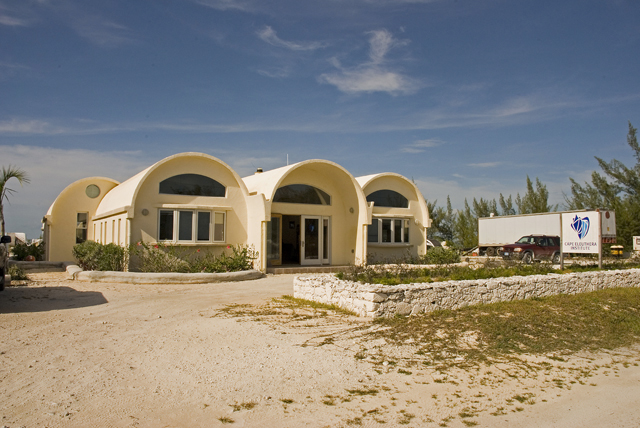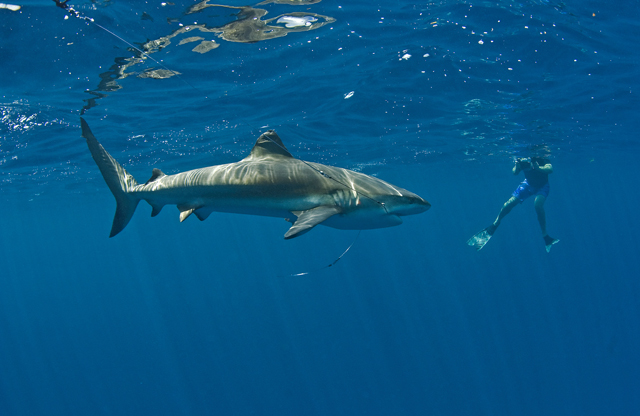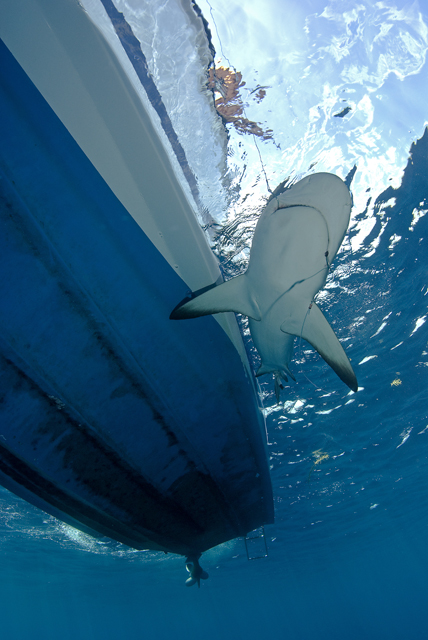Marine Life & Conservation
Our Future
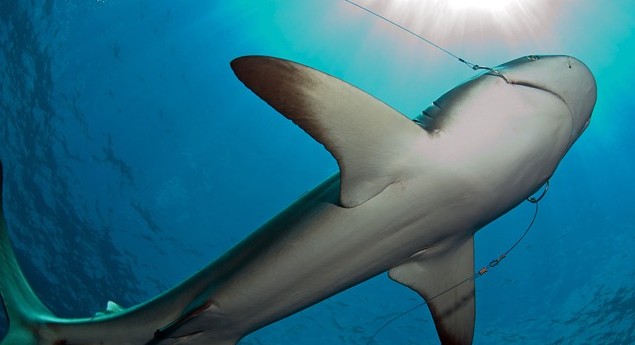
Concerns about natural resources and diminishing food supplies is at the forefront of every conscientious mind. But not everyone is taking a back seat view.
The Cape Eleuthera Foundation has been set up as a school and research institute exploring, improving and putting into practice natural ways of living and existing from our environment. Research Associate, Edd Brooks, said ‘our goal is to be 100% waste-free’. I was surprised to find such an interesting and worthwhile facility hidden away on Eleuthera, a remote island in the Bahamas, more famous for its links with Mariah Carey’s wedding rather than ecological breakthroughs.
The Foundation’s philosophy is to develop and build a number of systems that can sustain a community using only natural resources whilst minimising negative environmental impact. So in a nutshell, they have gone totally ‘green’ and are producing all their own food by aqua/agricultural means and then recycling any waste products to produce more food. It’s basically a closed loop system. 100% of all their power, for heating and lighting, is produced from Solar Energy and Wind Turbines. Bio Diesel (Vegetable Oil) is used to fuel any transportation, i.e. boats and trucks. Water for drinking and sanitation is captured from rainwater and 75% of the wood they’ve used to build the campus was grown from Casuarina Trees, an invasive species most people just disregard and burn.
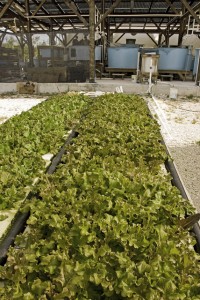
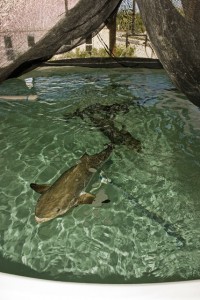 Surely this kind of research and development centre is where our future lies? Students from all over the world come and stay at the facility to conduct project work for schools, colleges and university degrees. Visiting Researchers and Scientists have a complete working laboratory at their disposal. This is the perfect environment for kids looking at careers in marine biology and related topics. It’s purely a ‘not for profit’ educational and research lab. Students and Researchers have to pay for the privilege but where better to conduct studies than a giant outdoor workshop in the Bahamas! Donations from privately owned businesses and organisations help support any new equipment purchases and building expansions.
Surely this kind of research and development centre is where our future lies? Students from all over the world come and stay at the facility to conduct project work for schools, colleges and university degrees. Visiting Researchers and Scientists have a complete working laboratory at their disposal. This is the perfect environment for kids looking at careers in marine biology and related topics. It’s purely a ‘not for profit’ educational and research lab. Students and Researchers have to pay for the privilege but where better to conduct studies than a giant outdoor workshop in the Bahamas! Donations from privately owned businesses and organisations help support any new equipment purchases and building expansions.
The Campus itself is basically split into two areas. The research centre has two 12-bed dormitories, timber framed classrooms, a common area, kitchen/catering facilities and gardens. The school has two wings. Each can accommodate up to 12 students. There is also a computer room, library, presentation rooms and wet and dry labs for research work. All within a stone’s throw of the sea.
A brand new Diving Centre has just been completed. It’s based in an impressive wooden building by the jetty. They also have 6 boats ranging from 19ft-40ft and 24 Sea Kayaks, used for 9-day school expeditions that circumnavigate the southern tip of Eleuthera.
There are about a dozen ongoing research programmes revolving around the marine environment. Aquaculture is the largest and most important ongoing project. Present worldwide fishing quotas are well exceeding regenerative capabilities (we have approx 50 years of wild fish stocks left). Although not a new concept, Aquaculture (fish farming) may well be the key. The first task is to find a species of fish that grows fast and doesn’t eat too much in the process. It also needs to be resilient to infection and disease. Cobia (Rachycentron canadum) is a pelagic species that grows up to 2m in length and can weigh as much as 68kg. It has a high food conversion ratio of 1kg of body mass for every 1.3kg of food it eats. The firm, white flesh is also very tasty and has become extremely popular in restaurants (prices are around $10-00 per kilo).
In 2003 the Institute began building a massive 3,000 metre/squared holding cage for the Cobia. The metal framework was positioned in 30 metres of water 1.5 miles off the coast by the Exuma Sound. This area is known to have reasonably strong currents and waves. Constant water movement helps prevent algae growth, which in turn reduces the risk of disease and parasites. Some of the young fish were lost in transit but around 10,000 fingerlings made it to the cage. Through 2005 the fish grew rapidly. Divers performed regular maintenance checks twice daily, cleaning away algae and taking out any dead or diseased fish. Fish mortalities were mainly due to poor quality feed. Then a Hurricane struck the island. Divers couldn’t get out to clear away the dead fish, which in turn, attracted the predators. Bull Sharks bit through the nets to get to the dead fish. More than 75% of the Cobia crop escaped through the holes. It was also a little disconcerting for the divers when they came face to face with a hungry Bull Shark inside the cage!
Later this year they will introduce a batch of home grown Cobia to the holding cage. To combat the Shark problem they have set up their own artificial ‘eco-system’ inside the cage. Groupers will eat any sick or dying fish before the Sharks are attracted and Gobies and Shrimp will act as cleaning stations to keep fish healthy.
Bonefish (Albula volpes) mortality rates is another high profile research project at the Institute. Florida Bonefish are a highly sought after, premier game fish that annually generates several billion dollars of revenue. Pound for pound they are known to be the best fighting fish in the ocean. They can grow up to 104cm in length and weigh 10kg. It’s mainly caught for sport and then released. The flesh itself isn’t considered to be very tasty. The Bonefish lives in shallow inshore tidal flats and co-exists with its main predator, the juvenile Lemon Shark. Part of the project is looking at the impact catch-and-release angling is having on the mortality rate of Bonefish. It’s been found that the stressed Bonefish are releasing a chemical that the Lemon Sharks are ‘homing in’ on. Once Students have identified this chemical handling and release methods can be adapted to stop the fish getting stressed.
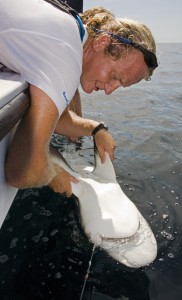
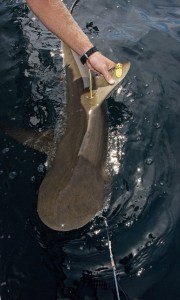 Edd’s primary research project involves monitoring the diminished Shark populations in the Bahamas. There has been a huge amount of worldwide media coverage highlighting the current plight of Sharks. Hundreds of thousands of Sharks are being slaughtered each year just for their fins. The Bahamas totally banned commercial Shark fishing in 2004. Long lining was also banned way back in 1993. But ‘local’ Shark numbers are still declining. Edd thinks the majority of Bahamian Sharks make long migrations into other territorial waters where they might not be protected. This specifically affects species like Tigers, Oceanics and Hammerheads. There is also the possibility that coastal tourism development is having an impact on Shark nurseries and inevitably this has a knock-on effect.
Edd’s primary research project involves monitoring the diminished Shark populations in the Bahamas. There has been a huge amount of worldwide media coverage highlighting the current plight of Sharks. Hundreds of thousands of Sharks are being slaughtered each year just for their fins. The Bahamas totally banned commercial Shark fishing in 2004. Long lining was also banned way back in 1993. But ‘local’ Shark numbers are still declining. Edd thinks the majority of Bahamian Sharks make long migrations into other territorial waters where they might not be protected. This specifically affects species like Tigers, Oceanics and Hammerheads. There is also the possibility that coastal tourism development is having an impact on Shark nurseries and inevitably this has a knock-on effect.
Around ten times a month Edd sets a buoyed long line with around 30 baited hooks. After one and a half hours the line is hauled in and any Sharks caught are recorded, tagged and released. Some are fitted with simple acoustic tracking devices. Edd surgically implants the small transmitters inside the Sharks. Edd has also placed compact VR2 receivers (Hydrophones) at certain points around Eleuthera. These listen out for any ultrasonic pings coming from the tagged Sharks. The recorded information is then downloaded onto his Computer back at base. The receiver records the time stamp and the ID number of the Shark as it passes. He can see any repetitive patterns and habitual movements that are forming. This year Edd is mainly focusing on the benefits of using baited remote underwater video surveys (BRUVS) to check on Shark numbers instead of long lining. BRUVS are far less stressful for the Sharks as there is no direct contact. His research will hopefully be used as a basis for other studies. Monitoring these movements will provide information on critical periods in Shark development so guidelines/restrictions can be put in place to protect the Sharks habitat.
Other current marine related projects include the population recovery of the Spiny Sea Urchin (Diadema antillarum), Patch Reef preservation, Lionfish surveys, Aquaponics for growing plants and restoration of the now thriving Wetland area.
It’s a known fact that our natural resources are running out fast. In the next few decades any studies made by R & D facilities like the Institute are going to be invaluable. Their findings may well be shaping our future. Long term it looks as though we could all be in for a bumpy ride.
Information
Edd is putting together a Shark tagging/research programme for visiting divers. This will give them a chance to go out on the boats, bait the lines, tag the Sharks and basically find out more about Shark ecology. They will also get a tour of the institute and presentations about ongoing research projects. The lucky one’s might even get a homegrown banana from the ‘poo’ garden!
Contact Details
Website: www.ceibahamas.org
E-mail: info@ceibahamas.org
Tel: 609 945 0710
More Information
Website: www.islandschool.org
Website: www.dcmsbahamas.org
Website: www.capeeleutherafoundation.org
Marine Life & Conservation
Leading UK-based shark conservation charity, the Shark Trust, is delighted to announce tour operator Diverse Travel as a Corporate Patron

 Corporate Patrons provide a valuable boost to the work of The Shark Trust. The Trust team works globally to safeguard the future of sharks, and their close cousins, the skates and rays, engaging with a global network of scientists, policymakers, conservation professionals, businesses and supporters to further shark conservation.
Corporate Patrons provide a valuable boost to the work of The Shark Trust. The Trust team works globally to safeguard the future of sharks, and their close cousins, the skates and rays, engaging with a global network of scientists, policymakers, conservation professionals, businesses and supporters to further shark conservation.
Specialist tour operator Diverse Travel has operated since 2014 and is committed to offering its guests high quality, sustainable scuba diving holidays worldwide. Working together with the Shark Trust will enable both organisations to widen engagement and encourage divers and snorkellers to actively get involved in shark conservation.
“Sharks are truly at the heart of every diver and at Diverse Travel, we absolutely share that passion. There is nothing like seeing a shark in the wild – it’s a moment that stays with you forever!” says Holly Bredin, Sales & Marketing Manager, Diverse Travel.
“We’re delighted to celebrate our 10th year of business by becoming a Corporate Patron of the Shark Trust. This is an exciting partnership for Diverse and our guests. We will be donating on behalf of every person who books a holiday with us to contribute towards their vital shark conservation initiatives around the world. We will also be working together with the Trust to inspire divers, snorkellers and other travellers to take an active role – at home and abroad – in citizen science projects and other activities.”
Paul Cox, CEO of The Shark Trust, said:
“It’s an exciting partnership and we’re thrilled to be working with Diverse Travel to enable more divers and travellers to get involved with sharks and shark conservation. Sharks face considerable conservation challenges but, through collaboration and collective action, we can secure a brighter future for sharks and their ocean home. This new partnership takes us one more valuable step towards that goal.”
For more information about the Shark Trust visit their website here.
For more about Diverse Travel click here.
Marine Life & Conservation
Shark Trust Asks Divers to help with Shark Sightings this Global Citizen Science Month

 Whether you are stuck for ideas of what to do with the kids or are off on the dive trip of your dreams. You can get involved in Citizen Science Month and help the Shark Trust by providing vital data about sharks are rays both close to home and further afield.
Whether you are stuck for ideas of what to do with the kids or are off on the dive trip of your dreams. You can get involved in Citizen Science Month and help the Shark Trust by providing vital data about sharks are rays both close to home and further afield.
In addition to reporting the sharks and rays you see on your dives, the eggcases you find on the beach, the Shark Trust is looking for some specific data from divers who are asked to report any Oceanic Whitetip and Basking Sharks.
Oceanic Whitetip Sharks
The Shark Trust are looking specifically for Oceanic Whitetip Shark sightings over the coming weeks and months. So, if you are diving anywhere in the world, please report your sightings via the website or app.
Website: https://recording.sharktrust.org/
App: Search The Shark Trust in your app store
The Oceanic Whitetip. Known for their incredibly long dorsal and pectoral fins, this species was once the most abundant oceanic-pelagic species of shark on the planet.
Large and stocky, they are grey or brown above, and white below and famous for their huge rounded first dorsal fin and paddle-like pectoral fins. The fins also highly prized within the shark fin trade. Whilst they are mostly solitary, Oceanic Whitetips do occasionally hunt in groups.
An inquisitive species, they were easy prey for fisheries. Combined with their low reproductive rate, they were inevitably at high risk of population depletion. And declines of up to 99% have been reported in certain sea areas. They are listed as Critically Endangered on the IUCN Redlist (2019).
Conservation efforts to discourage further declines include listing on CITES Appendix II and CMS Appendix I. They’re also the only species prohibited from take by all the Tuna RFMOs (Regional Fisheries Management Organisations). However, these measures do not mean that Oceanic Whitetips are not still caught – whether targeted or as bycatch – in some parts of the world. With populations declining at such a high rate, effective implementation of management measures is essential to ensure that the species can recover.
If you are lucky enough to get an image of an Oceanic Whitetip and you record your sighting on the Shark Trust app or website YOU CAN WIN! All images submitted with sightings, that also give consent to use in conservation messaging, will be in with a chance to win an Oceanic Whitetip T-shirt and mug. The competition will run until the end of “Shark Month” in July – so keep those sightings (and images) coming in.
Basking Sharks
Basking Shark (Cetorhinus maximus) season is upon us, and the Shark Trust is asking everyone to keep an eye out for these majestic giants over the summer months. If you see any, you can record your sighting to the Basking Shark Sightings database.
Each year, these mighty fish return to British waters to feed on plankton. You may see one, (or a few if you’re really lucky) from around April-October. They can be seen feeding at the surface of the water, where they look like they’re basking in the sun. Thus, their name!
Sighting hotspots around the British Isles include southwest England, Isle of Man, north coast of Ireland, and western Scotland. The Sea of the Hebrides is the most prolific sightings area in Scotland, but they have been spotted all around the coast and have even ventured into some of the sea lochs. The Shark Trust has received thousands of sightings since the Basking Shark project began, but more data is needed to truly understand what is going on with population numbers and distribution. You can help by recording your sightings this summer.
Great Eggcase Hunt
The Shark Trust has an Easter Egg Hunt with a difference for you to try. Take part in the Great Eggcase Hunt and get involved with a big citizen science project that helps shark, ray and skate conservation. And it’s an enjoyable activity for all the family.
The Shark Trust also want snorkellers and divers to record their underwater eggcase findings. Underwater records help pinpoint exactly where sharks and skates are laying their eggs and can help link to beach records. Learning the depth and substrate that they lay on also helps better understand the species.
Find out more: https://www.sharktrust.org/great-eggcase-hunt
Whether you are diving, snorkelling or exploring on the beach you can take part in Citizen Science Month and get actively involved in shark and ray conservation. Find out more: www.sharktrust.org
-

 News3 months ago
News3 months agoHone your underwater photography skills with Alphamarine Photography at Red Sea Diving Safari in March
-

 News2 months ago
News2 months agoCapturing Critters in Lembeh Underwater Photography Workshop 2024: Event Roundup
-

 Marine Life & Conservation Blogs2 months ago
Marine Life & Conservation Blogs2 months agoCreature Feature: Swell Sharks
-

 Blogs2 months ago
Blogs2 months agoMurex Resorts: Passport to Paradise!
-

 Blogs2 months ago
Blogs2 months agoDiver Discovering Whale Skeletons Beneath Ice Judged World’s Best Underwater Photograph
-

 Gear News3 months ago
Gear News3 months agoBare X-Mission Drysuit: Ideal for Both Technical and Recreational Divers
-

 Gear Reviews2 months ago
Gear Reviews2 months agoGear Review: Oceanic+ Dive Housing for iPhone
-

 Marine Life & Conservation2 months ago
Marine Life & Conservation2 months agoSave the Manatee Club launches brand new webcams at Silver Springs State Park, Florida


